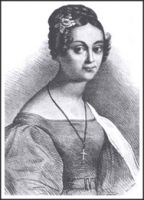Emilia Sczaniecka
«We all are equal as children the same God and the same Fatherland»
Emilia Sczaniecka
Why I consider this woman to be an important person?
Emilia Sczaniecka is an example of timeless morality, humanity, generosity and cordiality. Her political, social and educative activity supported the fight for liberation of Poland. She proclaimed the solidarity with a working class and helped poor and unhappy peoples. I admire her courage, energy ,heart and determination.
Biography
Emilia Sczaniecka was born 20 of Mai 1804 in Brody in the part of Poland under Prussian partition in gentry family. She had 2 brothers and 2 sisters. When Emilia had 6 years her father died and mother moved to Poznan, where children had possibility of education.
In 1813 started to attend to the school for girls, directed by Jan Samuel Kaulfus. This time girls studied languages (Polish, German, French, Italian), nature, music painting, hand craft and arranging of interior.
Very patriotic atmosphere of period Duchy of Warsaw (1807-1815) had a strong influence for Emily’s personality.
In 1818 she lost her mother and grandmother took the protection of four children deciding about the end of their education. But ambitious Emilia forced decision of continuation her studies in Dresden. There she met with activity underground group tending to liberation of Poland. She was very close friend of dr.Karol Marcinkowski, famous activist from Poznan but they never got married. She devoted her time to charity.
In 1823 Emilia came back home in Pakosław, where she administrated with great success the estate after her parents.
Before November insurrection 1830 gave money for insurgent army and founded Women’s Committee of Helping Insurgents. After she joined to Patriotic Society of Charity directed by Klementyna Hoffmanowa, where women organized hospitals, collected money and looked after wounded. Emilia worked as nurse and came with human suffering, which was a war result.
She took part in November uprising and was condemned for 6 months of prison and the confiscation her estate. But her popularity to enable to free her
In 1833 Emilia founded hospital in Pakosław, nursery school and school for children in the country.
She traveled a lot in Europe visiting Paris, London, Berlin, Brussels and maintained relations with Polish emigration. Emilia was very active in work for liberation distributing books and newspapers. She also was a member of underground society Związek Kosynierów.
During Spring of Nations in1848 she worked in field hospitals and took care of wounded, both countrymen as well soldiers at enemy’s army, helped prisoners ,supported widows and orphans.
Active to the last moment in spite of paresis her legs Emilia was an example of self-sacrifice in the fight of her homeland freedom and charity.
She died 11 of Mai 1896 in Pakosław and was buried on the modest cemetery in the country between ordinary peoples.
Bibliography:
- M.Rezler; „Emilia Szczaniecka”
- S.Król: „101 kobiet polskich”
- Sylwia Chutnik: „Demokratki w walce o niepodległość”
- Praca zbiorowa: Wielkopolski Słownik Biograficzny
Links:
Picture source:
http://commons.wikimedia.org/wiki/File:Emilia_Sczaniecka.jpg
Author: Krogalin
Rights; PD




